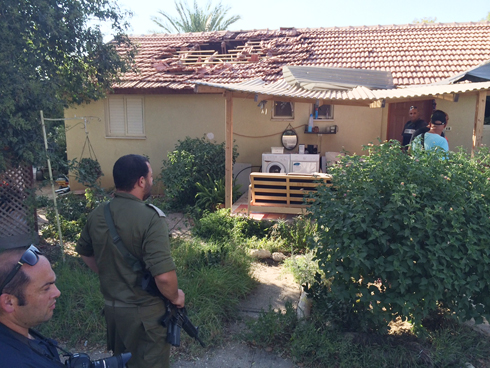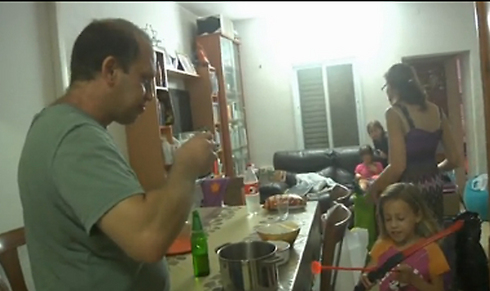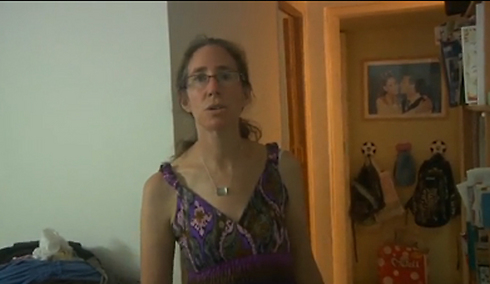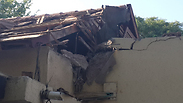
Nahal Oz residents refuse to return home: 'It's too dangerous'
Residents of the closest Israeli community to the Gaza border demand more bomb-shelters built, protection against tunnel and rocket threat.
The residents of Nahal Oz are tired of being Hamas' hostages. They've been living as refugees for over a month, with some 25 families staying at the "Hadassah Neurim" youth aliyah village in the Nataniya area while others are staying in kibbutz Revivim and kibbutz Dorot, and won't return home until the rocket fire stops completely.
"What did we go on Operation Protective Edge for, if nothing has changed? We won't go home like this," Yenina Barnea, one of Nahal Oz's residents, said.
At the moment, only around 50 people out of 100 families remain in the kibbutz, all of which have jobs that require their presence. The rest, especially families with children, have left.
Over the weekend, most of the Gaza border communities' residents returned to their homes, even though the Gaza operation was still ongoing as was the rocket fire. Dozens of rockets and mortar shells were fired during the day, at least one of them exploding in Eshkol.
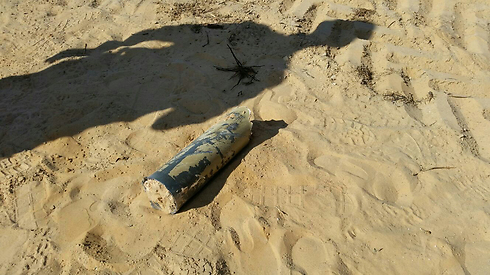
For now, they are staying at "Hadassah Neurim" and recently they even opened a makeshift kindergarten there, which houses 21 children every day with a volunteer teacher. The school-aged children stay in the youth village's rooms and take part in various activities.
The kibbutz residents demand the government to provide them with full protection against both the tunnel and mortar threats.
In addition, they demand that the state restores structures IDF soldiers used and stayed at during the ground operation to their previous condition, something that has not been done yet. The troops stayed in three kindergartens and the cleaning company that was hired to restore them to their original condition refuses to send its employees to Nahal Oz because of the security situation. This means the kindergartens in the kibbutz won't be able to take in the returning children.
Another demand the residents raised was constructing more safe rooms and bomb shelters in the kibbutz, which is the closest Israeli community to the Gaza border. The three kindergartens, for example, are not fully bomb-protected and in the event of a rocket or mortar hit, shrapnel could penetrate into the educational facilities.
The residents also want a better solution found to the short and insufficient warning time before a mortar falls.
"There is a lot of uncertainty alongside frustration. We're a kibbutz close to the fence, and there's no way we could have a routine here (like that). If that is the case, we won't come back to the same reality we've been living in for 14 years," Nahal Oz resident Yenina Barnea said.
"The education system (in the kibbutz) is not working. Hundreds of soldiers were staying there (in educational facilities), they hired a cleaning company and the manager of the company barred the workers from coming because it's dangerous. So the kindergartens are not clean. They're also not bomb-protected. We're waiting for the construction of a new bomb-protected kindergarten to which we could move the kids temporarily," she added.
Barnea also noted that some of the teachers who work at the kindergartens, residents of the area, are away because "they're in the same situation as ours."
"We have to prepare the kindergarten. The kids have been out of the house for a month. It's not a simple task," she added.
Many of the families in kibbutz Ein HaShlosha, who have yet to return to their homes, have decided, after long consideration, not to return. And, following the continuous rocket fire, the kibbutz decided to send away those families who did return.
"This is a hard decision made with mixed feelings and a lot of anger and frustration turned at the government, that appears to have forgotten us," Danny Cohen, an Ein HaShlosha resident, said. Now he's looking for a safe place for his wife and their four children.
"The families that returned with their children stay indoors all the time. We decided it wasn't fair on our children. Until we feel safe that our children could play outside, we'll take them to a safer place," he added.
Danny's wife Merav said: "When we came back there were still tanks in the kibbutz. We feel awful. We feel like we've been abandoned, that we have no rights in this country, that we have no meaning besides being here on the border. In the past two days I've been hearing Hamas threaten and does as it said, while the government doesn't hear us and won't give us answers. We're in a country that's supposed to protect us, rather than us hiding like rats in holes. Talk around the kibbutz is difficult. There's a feeling no one is taking care of us. Why did you bring us back?"
The situation in Nahal Oz and Ein HaShlosha does not necessarily reflect on the situation in other communities in the area. According to estimates, some 85% of the residents in the area who left when Operation Protective Edge began have already returned. In many of the communities the education system will work as planned on Sunday.










